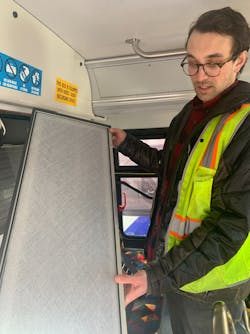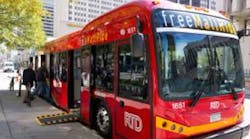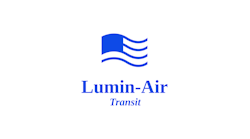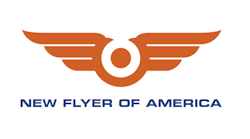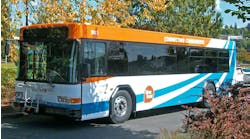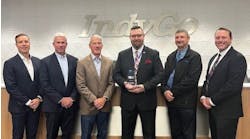Denver RTD upgrading air filters across its bus fleet
The Denver Regional Transportation District (RTD) has begun upgrading the air filters across its bus fleet, a change that improves air quality inside these enclosed spaces by trapping smaller particulates, including pollen, bacteria, mold, smoke and various types of dust.
Last fall, the agency’s master mechanics began installing MERV-13-equivalent electrostatic filters on the 40-foot Gillig and longer, articulated New Flyer coaches seen on local routes, and soon will add them to the MCI buses used for regional and SkyRide routes once a suitable filter design has been finalized. As of early March, 162 of the approximately 1,000 buses in RTD’s fleet carry the higher quality air filters. They are also being added to new buses as the agency receives these vehicles and prepares them for service.
All of RTD’s buses, with the exception of its MallRide vehicles, previously included air filters with a minimum efficiency reporting value (MERV) rating of 6 or 7, which trap particles down to three microns in size and include dust mites, mold and pollen. Filters with MERV-13 or higher ratings can trap particles between .3 and one micron in size.
“Improving air quality is part of RTD’s commitment to a cleaner, healthier environment for our customers and operators,” RTD Technical Services Manager Bill Weidenaar said. “By upgrading to MERV-13-equivalent filtration, we are capturing and removing a greater number of contaminants from the air, whether that be viruses, smoke or dust.”
RTD made the decision to upgrade its bus air filters after reviewing testing that showed filtration at a MERV-13 level to be effective for transit, and upon testing an electrostatic MERV-13-equivalent filter on an RTD New Flyer articulated bus. After 13,439 miles, airflow through the filter, made by Lumin-Air, was reduced two percent. Such a result demonstrates these filters can last about 24,000 miles – four times longer than the current interval for changing them out.
“The electrostatic filters attract contaminants while allowing greater airflow than standard filters,” noted RTD equipment engineer Nick Rorres. “The MERV-13 filters allow more air to pass through while trapping more bacteria. These kinds of filters have been used for decades in laboratories and hospitals, and it was just a matter of time before they expanded into transportation. I think as COVID-19 winds down, and we head into cold and flu season, they definitely offer an extra level of protection.”
While eliminating risk in an enclosed space is impossible, Rorres added, “Reducing circulation of contaminants will help, without a doubt.”
